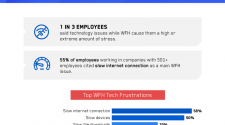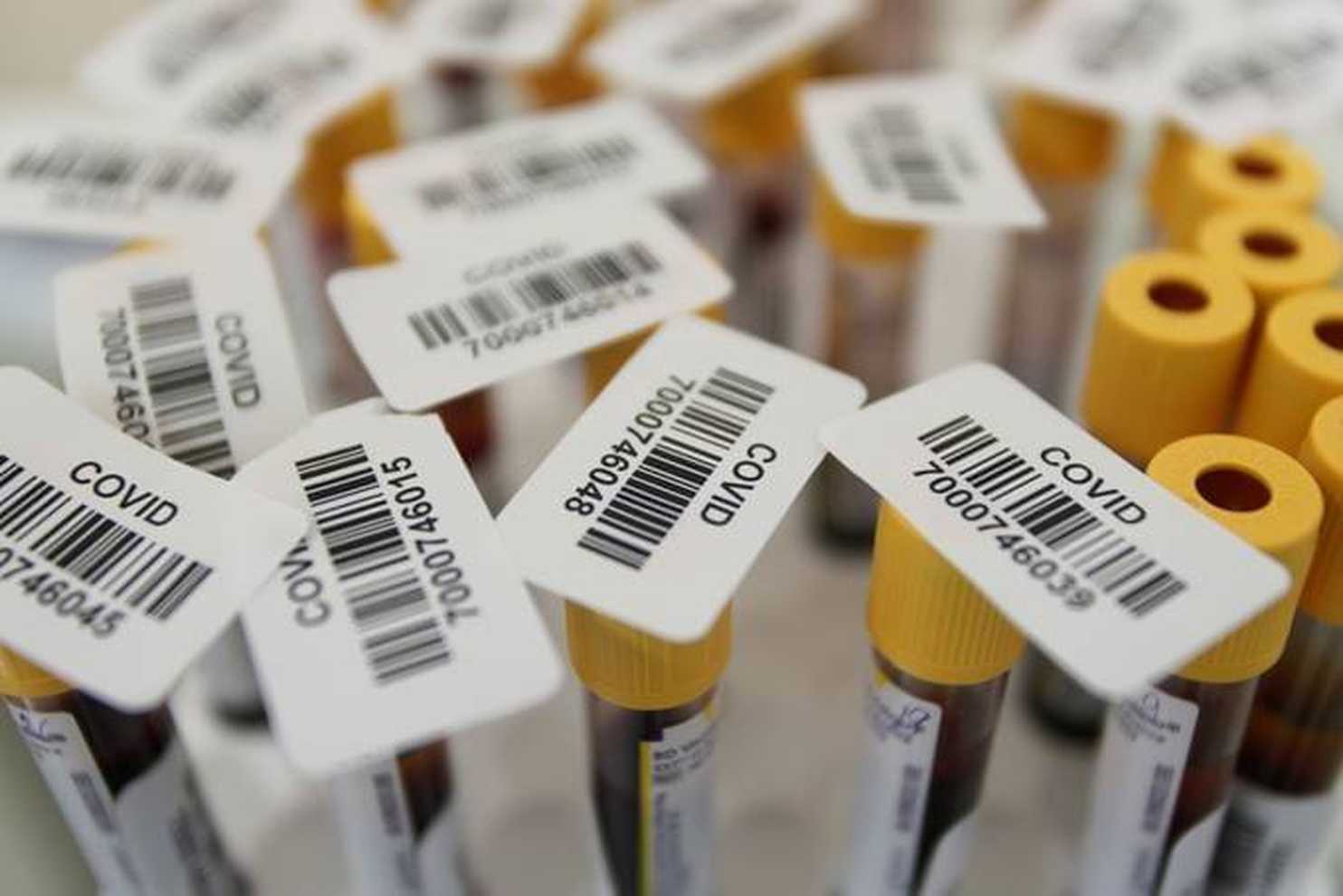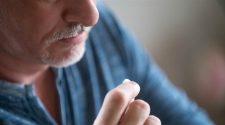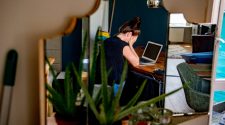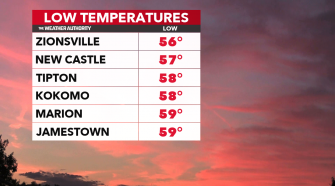with Paulina Firozi
On the surface, it might sound good: Test Americans to find out who already had the novel coronavirus. Give those with protective antibodies an “immunity passport” allowing them to return to work safely.
But the American Civil Liberties Union — the nation’s largest civil rights group — isn’t so jazzed about the idea of providing people with documentation showing they’ve recovered from the disease.
Other countries are considering so-called immunity passports and academics in the U.S. have tossed around the idea as a hypothetical way to start returning some of society to normal in a safe way.
But separating Americans into two groups, the covid-positive and the covid-negative, would disproportionally hurt people who work in the service sector, incentivize people to actively seek out acquiring the virus and seriously undermine individual rights to privacy, the American Civil Liberties Union argues in an analysis provided first to The Health 202.
“As tempting as immunity passports may be for policymakers who want a quick fix to restart economic activity in the face of widespread suffering from the covid-19 pandemic, they present both public health and civil rights concerns that cannot be overlooked,” the ACLU’s Esha Bhandari and ReNika Moore wrote.
Maxim Shemetov (Reuters)
Some kind of certification indicating that people have had and recovered from coronavirus could indeed be tempting for policymakers as they hint at a return to normalcy.
Confirmed covid-19 cases are expected to tick upward as lockdowns are lifted across the nation. Yet virtually everyone is yearning for a taste of their pre-pandemic life that was so radically upended. Some political leaders — particularly President Trump and his officials — say it’s time to start letting Americans return to work amid historic unemployment.
Health and Human Services Secretary Alex Azar declared yesterday that it’s safe to reopens because half of counties reporting “haven’t had a single death” and more than 60 percent of all covid-19 cases are in just 2 percent of counties.
“We have got to get this economy and our people out and about working, going to school again, because there are serious health consequences to what we have been going through,” Azar said on CNN’s “State of the Union.”
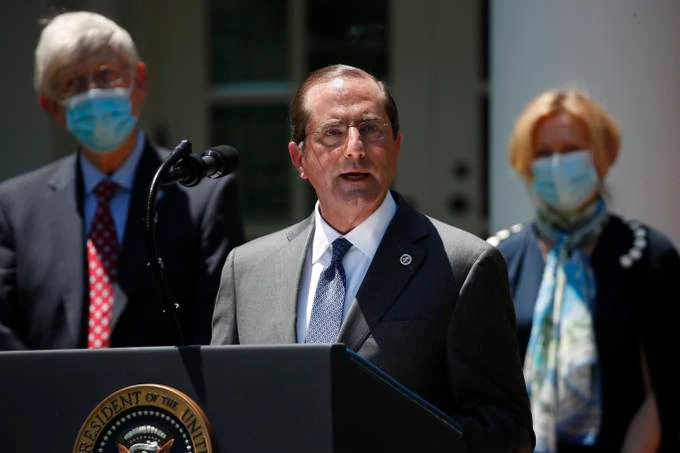
Health and Human Services Secretary Alex Azar speaks in the Rose Garden on Friday. (Alex Brandon/AP)
As the lockdowns are lifted, experts agree the key to preventing large-scale outbreaks lies in expanding testing and contact tracing. Antibody testing, where a person’s blood is examined for clues about whether they were already infected, is considered a key part of thaty effort because it offers valuable information about who can spread the virus and who can’t.
In theory, Americans with antibodies could be given more freedom to return to society because they’d be considered immune to the disease and unable to transmit it to others. Some policymakers think providing those who are immune with some kind of documentation to prove it would help people feel safer going back to work, school and other activiies. Several other countries, including Chile, Germany and Great Britain, have seriously considered so-called immunity passports.
Yet the ACLU thinks there are significant problems with such an approach because of everything it entails.
Its paper notes the science isn’t even clear on whether people who already had the coronavirus have developed enough antibodies to protect from future infections — or how long the immunity might last. Given how antibodies typically develop, it’s highly likely an infection will confer some level of protection, but it will be months before scientists are able to confirm that.
There are also outstanding questions about how accurate antibody tests are.
“Even small error rates could make reliance on antibody tests unworkable, or dangerous for those workers who get a false positive for antibodies,” Bhandari and Moore wrote.
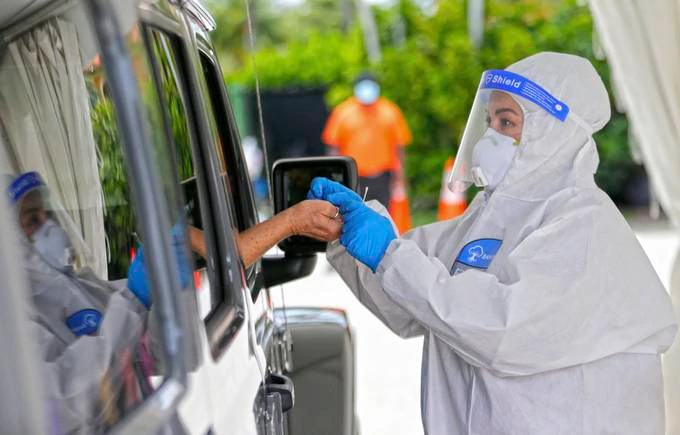
Banyan Medical Systems health workers perform coronavirus antibody testing at a drive-through site in Bal Harbour, Fla. (David Santiago/Miami Herald/AP)
Science aside, immunity passports could seriously jeopardize civil liberties and civil rights, according to the ACLU.
Imagine a system where workers were divided into two classes — the immune and non-immune. Those in the non-immune class would be at a serious disadvantage if an immune worker were available to fill a position. Business owners trying to make their own workplaces as safe as possible would have every reason to give priority to those who already survived covid-19.
Such a system would be applied more often to service-sector jobs in health care, caregiving, food production, emergency services, sanitation, transportation and delivery, which can’t be performed remotely like many white-collar roles, the ACLU notes. People who tend to work in these jobs — more often black and Latino Americans — would be at a particular disadvantage if bosses started discriminating based on immunity status.
To get a job, people might even seek to get infected by the coronavirus to gain immunity. And because minorities are more likely to have serious covid-19 cases, that could result in more fatalities.
“It is foreseeable, maybe even inevitable, that an immunity passport system, with all its attendant pressures on workers to acquire immunity, would result in disproportionately more illness and death among people of color in the U.S.,” the ACLU paper says.
Ahh, oof and ouch
AHH: Coronavirus testing is finally expanding. But in numerous states, not enough people are showing up to get tested.
A survey of governors’ offices and state health departments found ramped-up testing capacity is surpassing the patient supply, Steve Thompson, Juliet Eilperin and Brady Dennis report.
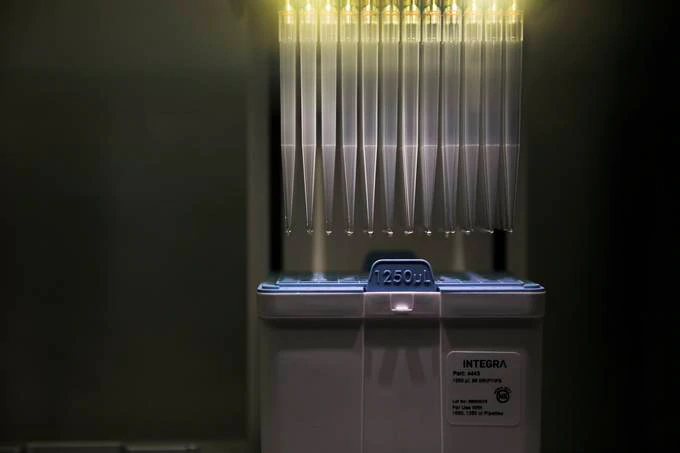
Samples are tested for the coronavirus at Gravity Diagnostics in Covington, Ky., one of the labs tasked with ramping up their testing capabilities. (Maddie McGarvey for The Washington Post)
“Many have scrambled to make testing more convenient, especially for vulnerable communities, by setting up pop-up sites and developing apps that help assess symptoms, find free test sites and deliver quick results,” they write. “But the numbers, while rising, are well short of capacity — and far short of targets set by independent experts. Utah, for example, is conducting about 3,500 tests a day, a little more than a third of its 9,000-test maximum capacity, and health officials have erected highway billboards begging drivers to ‘GET TESTED FOR COVID-19.’ ”
Utah’s health department spokesman suggested the dearth of people getting tested could be because people don’t feel they need it, or they’re feeling only mild symptoms and believe a positive lab result wouldn’t make a big difference.
Experts also point to distrust about testing operations or lingering concerns that tests are scarce. People across the country are still confused about who qualifies for a test, after initially strict rules designed to preserve tests for those who needed them the most.
“Another major hurdle: lingering confusion about who qualifies. In the earliest days of the outbreak, Americans were told that only the sickest and most vulnerable should get tested while others should stay home,” Juliet, Steve and Brady write. “Last month, the Centers for Disease Control and Prevention relaxed its guidelines to offer tests to people without symptoms who are referred by local health departments or clinicians.”
OUCH: A puzzling inflammatory syndrome in children believed to be linked to covid-19 now has a name.
Late last week, the Centers for Disease Control and Prevention issued an advisory naming the condition multisystem inflammatory syndrome in children, or MIS-C, Ariana Eunjung Cha and Chelsea Janes report.
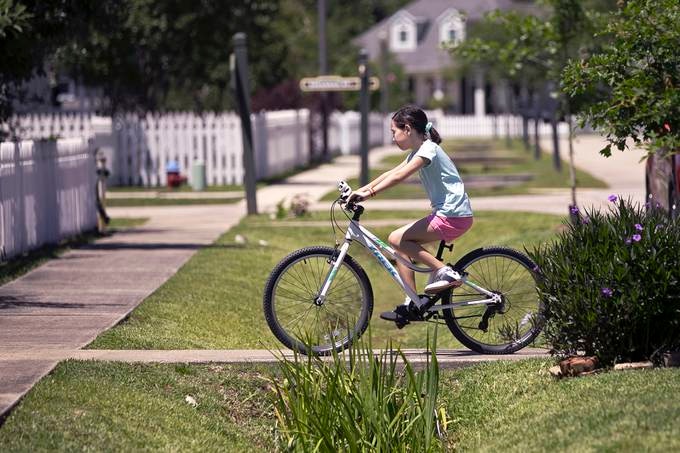
Juliet Daly, 12, rides her bike outside her home in Covington, La., after recovering from a rare heart condition believed to be triggered by an inflammatory response to covid-19. A nasal swab confirmed she also had a second viral infection, adenovirus. (Gerald Herbert/AP)
They wrote about a previously healthy 12-year-old, Juliet Daly, who survived after twice going into heart failure because of the rare condition. She was among the first known children in the United States to develop the syndrome.
“It was still relatively early in the outbreak, April 6, and the hospital hadn’t seen other children in this condition. But the doctors knew enough about the pathogen’s effects on adults that they immediately suspected the coronavirus,” they write. “Cases like Juliet’s, a puzzling inflammatory syndrome in children believed linked to covid-19, had been popping up in different parts of the world for months, but it wasn’t until recently that health authorities began tracking the phenomenon.”
“Heartbeats are controlled by electrical impulses that travel down the right and left branches of the heart at the same speed. Somewhere in Juliet’s heart, a block was causing the system to go haywire,” they write. “A team of pediatric cardiology specialists gave Jennifer a name for her daughter’s condition: acute fulminant myocarditis — a sudden onset of heart failure, shock or life-threatening arrhythmias.”
Later, her nasal swabs came back positive for the coronavirus and adenovirus.
In an op-ed in the Wall Street Journal, former FDA commissioner Scott Gottlieb cited the rare condition as an example of “how much we don’t know about Covid-19.” He wrote that data on covid-19 patients “isn’t being streamlined and shared with the public quickly.”
“There are shortcomings in our ability to access the electronic systems designed to help glean facts from clinical data,” he wrote.
“CDC hasn’t been filling its traditional role of promptly publishing medical findings that may help doctors care for patients. Instead, a lot of this information is being passed around social media, by email or even through word of mouth. It’s trial and error on a global scale.”
OOF: At least ten facilities operated by one of the largest nursing home chains violated federal standards meant to curb the spread of disease.
Government inspectors found there were breakdowns in infection control and prevention in at least ten homes operated by Life Care Centers of America. The inspections were run by the Centers for Medicare and Medicaid Services, Debbie Cenziper, Sidnee King, Shawn Mulcahy and Joel Jacobs report.

A person is loaded into an ambulance at the Life Care Center in Kirkland, Wash. (Ted S. Warren/AP)
The breakdowns occurred in the past six weeks, as covid-19 began to spread in Life Care’s facilities nationwide. That’s according to batch of inspection reports obtained by The Post of more than two dozen Life Care homes.
At these nursing homes, inspectors have since then discovered staff members who did not wash their hands or enforce social distancing guidelines. “At one home in Denver, staffers left open the door of an isolation room, allowing a patient with covid-19 to slip into the hallway without a face mask and sit next to a room with two healthy residents,” they write.
Life Care, based in Tennessee, has said that no amount of preparation could have kept the virus at bay and that administrators worked early and often with health authorities to contain the spread of infection. There’s no national data to determine whether Life Care’s infection and death writes are higher than other chains or whether other chains have been cited for violations since the pandemic began.
The discoveries don’t include “deficiencies found at the Life Care Center of Kirkland in Washington state, which suffered the country’s first reported outbreak of the novel coronavirus in February,” our colleages write.
Federal officials say they will collect data weekly on coronavirus deaths in nursing homes.
Facilities will have to start reporting the number of cases and deaths to the government, and federal officials say they will start publishing that information online, along with the name of the homes, by the end of the month, Maria Sacchetti reports.
“The data will offer a first look at the impact in such states as Texas and Virginia that have declined to identify nursing homes with covid-19 infections,” she writes.
The administration’s plan to start collecting and posting this information “capped months of frustration over the lack of information in many states as the death toll in nursing homes soared. Some grief-stricken family members said they were uninformed about infections, and disturbing stories emerged of overwhelmed facilities, such as a New Jersey nursing home where bodies piled up.”
The road to a vaccine
The Trump administration unveiled a plan to develop hundreds of millions of coronavirus vaccine doses by the end of the year.
If it works, the process outlined Friday “would shatter conventional wisdom about the typical process for developing vaccines for emerging infectious diseases,” Stat News’s Lev Facher reports.

President Trump speaks about administration efforts to develop a coronavirus vaccine. (Kevin Lamarque/ Reuters)
“At a Rose Garden press conference, the president and his deputies acknowledged their goal, dubbed ‘Operation Warp Speed,’ was lofty,” Lev adds. “…But they allowed themselves little ambiguity. Mark Esper, the defense secretary, pledged to deliver a vaccine ‘at scale’ to the U.S. and its foreign partners by the end of the year.”
Anthony Fauci, director of the National Institute of Allergy and Infectious Diseases, has said developing a vaccine would take between 12 to 18 months, acknowledging that such a feat would still be a near biomedical miracle, Lev adds.
There are at least eight vaccine candidates that are being tested in humans. As these possibilities move forward, officials are considering what a vaccine rollout would look like.
Those discussions include reserving any first available set for front-line health workers, the Wall Street Journal’s Peter Loftus reports.
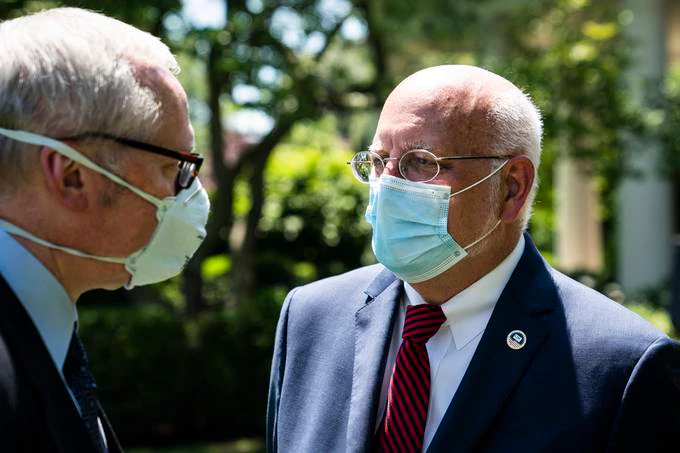
Robert Redfield, director of the Centers for Disease Control and Prevention speaks with others after President Trump participated in a vaccine development event in the Rose Garden. (Jabin Botsford/The Washington Post)
There’s no guarantee any of the candidates will work safely. But numerous pharmaceutical giants are working to develop the capacity to make hundreds of millions of vaccine doses.
“Several drugmakers that have been building up their capabilities to make coronavirus vaccines have pledged to deliver millions of doses this year,” Peter writes. “Yet a fuller supply to vaccinate the general population might not become available until well into 2021, according to company projections and estimates by vaccine experts.”
Concerns about limited vaccine supplies, at least initially, have “triggered maneuvering over which countries get first dibs. Companies receiving U.S. federal grants, including J&J, Moderna and Sanofi, are expected to reserve some doses for Americans, according to industry officials.”
Coronavirus latest
Here are a few more stories to catch up on after the weekend:
The Trump administration’s response:
- Tensions between the White House and the CDC have spilled over into the public eye after White House trade adviser Peter Navarro criticized the CDC over its coronavirus response in an interview on NBC News’s “Meet the Press,” as Felicia Sonmez and Darryl Fears report.
- As the pandemic continues, Trump has “deferring critical decisions to others, undermining his credibility with confusion and misinformation, and shirking responsibility in what some see as a shrinking of the American presidency,” Ashley Parker and Philip Rucker write.
- Former president Barack Obama chided U.S. leaders for fumbling their handling of the pandemic, as Michael Scherer and Katie Mettler write. “More than anything, this pandemic has fully, finally torn back the curtain on the idea that so many of the folks in charge know what they’re doing,” Obama said in a streamed speech for graduates of 74 historically black colleges and universities across the country. “A lot of them aren’t even pretending to be in charge.”
The economic fallout:
- Federal Reserve Chair Jerome H. Powell warned in an interview on CBS News’s “60 minutes” that the nation’s economic recovery could “stretch through the end of next year; we really don’t know.”
- Near half of respondents in a survey of San Francisco-area restaurant owners say they have laid off all of their staff amid shelter-in-place orders, the San Francisco Chronicle’s Janelle Bitker writes. And 1 in 10 say they expect they’ll have to shutter permanently.
In the states:
- Six states have said they’re developing apps to trace the spread of the coronavirus, but they’re struggling, Politico’s Alice Miranda Ollstein and Mohana Ravindranath report. The push is an effort to avoid reliance on apps from big tech companies, but the “early experience of these states is raising questions about whether locally developed apps will gain enough critical mass to help health officials keep tabs on the virus before new hot spots explode.”







